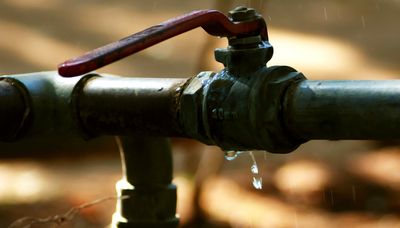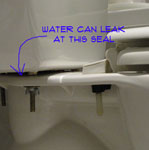Leading 5 Factors for Water Leaks
Leading 5 Factors for Water Leaks
Blog Article
In this article in the next paragraph you can locate more wonderful resources in relation to Where to Find Water Leaks.

"Be careful of little expenses. A little leakage will sink a great ship." - Benjamin Franklin.
He couldn't have actually been more best since water leaks in our houses cause a waste of sources, increasing our water expenses. This boost might appear negligible at initially, it can lead to substantial expenditures that can damage your financial institution. In addition to a rise in costs, water leaks likewise cause unwanted natural development, structural damages, and also even electric threats.
If you have a water leakage isn't always easy due to being not able to see many of the pipework in your residence, figuring out. If you have had an increase in your water costs recently, noticed water stains on wall surfaces as well as ceilings, smelt lousy odor, and so on. You could intend to consider asking for plumbing solutions to get it checked out.
There are numerous causes of water leaks, and we have actually put together the usual reasons listed below. Inspect to see if you have actually had associated issues in your house just recently.
Deteriorated pipe joints
Pipeline joints are the components of our plumbing system where the pipes attach. It is vital to keep in mind that even though pipes are made to hold up against pressure as well as last for a while, they weren't created to last permanently; as a result, they would deteriorate over time. A typical indication of damaged pipeline joints is extreme sound from faucets.
High water pressure
You noticed your residence water stress is more than common yet then, why should you care? It runs out your control.
It would certainly be best if you cared because your average water stress should be 60 Psi (per square inch) and although your house's plumbing system is developed to stand up to 80 Psi. A boost in water stress can place a strain on your house pipes as well as lead to fractures, or even worse, burst pipes. Get in touch with a specialist regarding managing it if you ever observe that your home water pressure is higher than normal.
Rust
As your pipework grows older, it gets weaker and also more vulnerable to corrosion after the regular flow of water with them, which can eat away at pipelines and also trigger fractures. A visible indication of deterioration in your home plumbing system is discoloration as well as although this might be difficult to discover as a result of most pipes hidden away. We suggest doing a frequent appointment every few years and also transform pipes once they are old to make sure a sound plumbing system
Blocked drains
Food particles, dust, and oil can create clogged drains pipes and also block the flow of water in and out of your sink. Raised pressure within the seamless gutters can end as well as create an overflow up fracturing or rupturing pipes if undealt with. To avoid clogged up drains in your house, we advise you to prevent pouring bits down the tubes and also regular cleansing of sinks.
Busted seals
An additional source of water leaks in homes is damaged seals of residence devices that use water, e.g., a dishwashing machine. When such appliances are installed, seals are set up around water adapters for simple flow of water through the equipment. A busted seal can create leakage of water when in usage.
With little or no understanding of plumbing, understanding your home's plumbing system sufficient to fix several of these issues (without effect) can be an inconvenience. Connect with plumbing professionals in Pittsburgh, Divine Superintendence, Rochester, and also environ today, and they'll make those concerns go away.
He could not have actually been a lot more ideal since water leaks in our homes result in a waste of sources, enhancing our water bills. If you have had an increase in your water costs recently, discovered water stains on wall surfaces as well as ceilings, smelt lousy smell, and so on. A boost in water stress can put a pressure on your house pipelines as well as lead to fractures, or even worse, ruptured pipes. Another cause of water leakages in homes is broken seals of house devices that utilize water, e.g., a dish washer. When such devices are installed, seals are installed around water adapters for very easy passage of water with the device.
5 TIPS IN DETECTING A WATER LEAK IN YOUR HOUSE
Water leaks can be hard to find in your home, yet they can be so common. We rely on water every day in our home, which is why a leak can cause big problems. By detecting them early, you can save money and further damage, getting the problem fixed as soon as possible. Here are 5 tips to help you detect a water leak in your home, so you can contact a plumber straight away and get the issue sorted.
Check your water meter
Many people underestimate the value of the water meter in their home. It can be one of the best ways to tell if you have a leak early on, so you can get on top of it before issues start arising. Start by turning off all the water in your home: taps, washing machine, dishwasher, etc. Now take a look at the meter – if it’s still changing with everything turned off, it’s likely you have a fast-flowing leak that you need to get on top of straight away. If nothing changes, then leave your meter for an hour or two and come back to it. Did it change in this time? It’s likely you have a slower leak, which isn’t as urgent but still handy to get fixed so it doesn’t become a bigger problem.
Keep an eye on your bill
Another good way to detect a leak in your home is by keeping an eye on your water bill. It helps if you have a past bill from the same period of time. You can compare like for like and determine whether your water usage has increased significantly. If it has, there may be a leak in your system that you haven’t picked up before. A professional plumber can check through all of your pipes and determine where it is coming from.
Look for damage
If you have a leak inside your home, you will notice damage over time. Take a look at your showers and bathtubs and note whether any of the tiles surrounding the area seem to be discoloured or damaged in any way. There may be water stains, mould or peeling material that has resulted from a build up of moisture over time. Make sure you take a look under sinks at the back of cupboards that don’t get accessed regularly. This is where damage can go unnoticed and build up over periods of time.

As a fervent reader about Where to Find Water Leaks, I imagined sharing that article was worthwhile. Appreciated our posting? Please share it. Let others check it out. I treasure reading our article about How to Find and Prevent Water Leaks in Your Home.
Perfect solution? Dial! Report this page